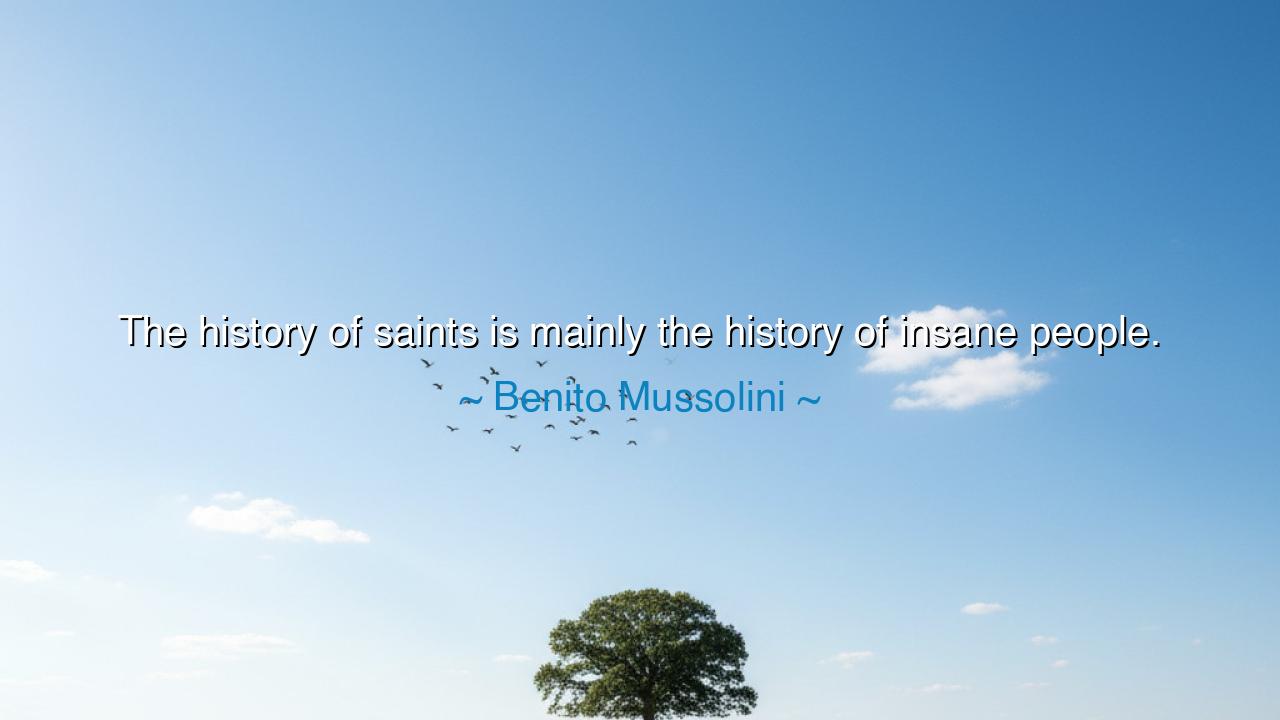
The history of saints is mainly the history of insane people.






When Benito Mussolini declared, “The history of saints is mainly the history of insane people,” he uttered words that burn with irony, yet shimmer with an uncomfortable truth about the soul of humanity. In these few sharp syllables, he touched upon the ancient tension between sanity and transcendence, between reason and divine madness. For throughout the ages, those who have reached toward the light of the eternal have often been called mad by the dwellers of the earth. The saint, the prophet, the visionary—each has walked a path so far from the comfort of common thought that their footsteps have seemed the steps of the deranged.
But what is insanity, and what is sanctity? The line between them has always been faint, shimmering like a mirage between the deserts of the mind. The saints defied kings, scorned gold, and renounced fleshly comfort. They spoke to unseen voices and acted upon visions no one else could see. In a world ruled by logic and possession, such behavior must surely appear as madness. Yet, if madness it be, then it is a holy madness—a flame that consumes the self in service of something greater. Mussolini, a man intoxicated by power, saw in such devotion an affront to his creed of strength and order. He mistook spiritual fire for disorder, and divine passion for lunacy. But perhaps, beneath his scorn, he recognized a truth he feared: that those who love an ideal more than life itself are the only ones who truly change the world.
Look to Saint Francis of Assisi, that gentle madman who stripped himself naked in the marketplace, renouncing his father’s wealth and embracing the beggars of the earth. To the men of his time, he was surely insane—a fool who kissed lepers and spoke to birds, who called the sun his brother and the moon his sister. Yet through his madness, a revolution of love was born. He healed not bodies, but souls; he taught that peace begins in the heart, not in the sword. His “insanity” outlasted the empires of his age. The history of saints, then, is not a record of deranged minds—it is the chronicle of those whose vision pierced the veil of the ordinary, whose hearts were too vast for the narrow cages of reason.
Even the ancient philosophers understood this paradox. Plato, in his dialogues, spoke of the divine madness that visits poets, lovers, and prophets—a madness sent by the gods to awaken the human soul. For how could one touch eternity with a mind chained to the ordinary? It is the madness of love, of faith, of uncompromising vision that tears open the boundaries of the possible. Without it, there would be no martyrs, no art, no revelation. The world would remain as gray as stone, unmoved by passion, untouched by truth.
Yet Mussolini’s sneer carries a dark warning too. There is madness that uplifts, and there is madness that destroys. The same fire that sanctifies can also consume. The tyrant, too, believes himself chosen, believes his vision divine. And so, in mocking the saints, Mussolini unknowingly spoke of himself. His “rational” pursuit of power became its own form of insanity—a desecration of the human spirit disguised as logic. Thus, we learn that the line between the saint and the madman lies not in their passion, but in the direction of their love. One burns for humanity, the other for domination.
The lesson, O seeker of truth, is this: do not fear the name of madness if your heart is aflame with goodness, beauty, and justice. To live with vision in a blind world is to seem insane. To love when others mock, to speak when others are silent, to dream when others despair—these are the holy insanities that heal the world. Do not measure your sanity by the comfort of the crowd, for it is the crowd that crucified the prophets and built shrines to them centuries later.
Therefore, let each of us cultivate our own sacred madness—the courage to believe in something higher than self-interest, the strength to act upon conviction even when mocked or misunderstood. Let us be “insane” enough to forgive when wronged, to hope when all seems lost, to stand for truth when it is dangerous. For in such divine folly lies the seed of all greatness. The world calls them mad—but it is through these “mad” souls that humanity remembers its divinity.






AAdministratorAdministrator
Welcome, honored guests. Please leave a comment, we will respond soon